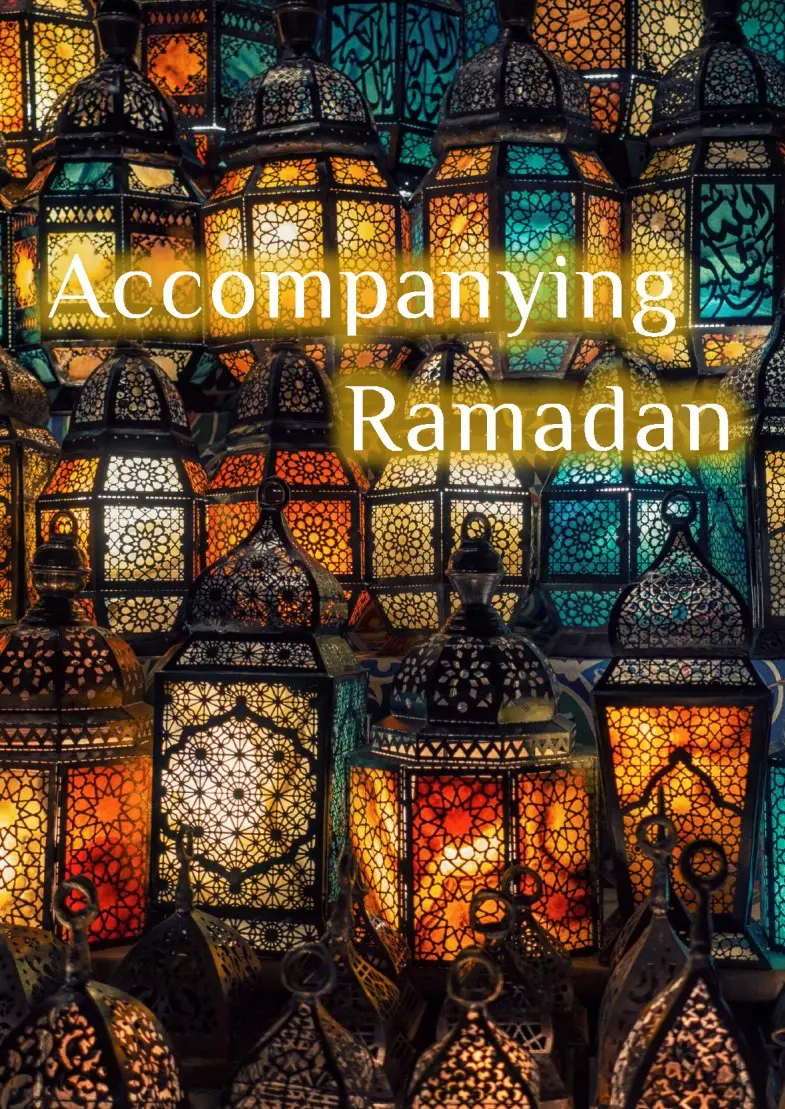Committee for Interreligious Dialogue
The Scottish Bishops' Committee for Interreligious Dialogue exists to make Catholics and others aware of the importance of interreligious dialogue within the life of the Church. Enjoy browsing this site to discover more about the work of the Committee and how you might get involved.
Interfaith News & Events from the Scottish Bishops' Committee
LATEST UPDATES
Visit our Blog Page to read our latest entries
Visit our Letters page for the latest letters sent to Scottish faith communities

Click here for some useful materials , to help us make the most of the season of Lent.
Many thanks to the Jesuit parish in Newcastle for compiling them.
Ramadan
while Christians mark the season Lent Muslims around the world observe Ramadan. Click below for an excellent guide to Ramadan written by Cardinal Michael Fitzgerald
Nostra Aetate and Pope Leo
Nostra Aetate - 60th Anniversary -
Pope Leo Celebrates with Faith Leaders
Walking Together in Hope
At 'Walking Together in Hope", hosted by Pope Leo on 28th October, he underlined the importance of interreligious dialogue saying that with Nostra aetate, the Second Vatican Council’s Declaration on the relation of the Church to non-Christian Religions, “a seed of hope for interreligious dialogue was planted”.
“Today, your presence bears witness that this seed has grown into a mighty tree, its branches reaching far and wide, offering shelter and bearing the rich fruits of understanding, friendship, cooperation and peace.”
The Holy Father was addressing his remarks to representatives of world religions, members of the diplomatic corps accredited to the Holy See, and Vatican and Church officials committed to interreligious dialogue, who had gathered in the Paul VI Hall to celebrate the anniversary of the Council’s historic Declaration.
Read more about 'Walking together in Hope'.
Click here to watch 'Nostra Aetate - A Milestone'. (11 minutes)
Click here to open and read the text of Nostra Aetate.
Scottish Interfaith Week Video Launch
Interfaith Scotland celebrates “Exceptional” school engagement work at Scottish Interfaith Week Interfaith video launch
Interfaith Scotland recently held a special launch event for their short film marking 20 years of Scottish Interfaith Week (SIFW).
Interfaith Scotland recently held a special launch event for their short film marking 20 years of Scottish Interfaith Week (SIFW).
Among the speakers at the launch were Joe Sikora, Interfaith Officer for the Catholic Church and Claire Butler PT of Religious Education at St. Roch’s Secondary, Glasgow who have been collaborating on engaging young people in interreligious dialogue for the past year.
St. Roch’s were one of a number of schools who took part in a pilot programme leadership programme run jointly by the Xaverians, Pax Christi, Justice and Peace Scotland and the Interfaith Officer. The aim of the course is to encourage pupils taking part in the Caritas Award to engage in activities related to the work of these agencies of the Church in Scotland.
Following on from the two-day residential course, St. Roch’s Caritas pupils took part in the 2025 Human Fraternity Day Conference held in the Bute Hall at the University of Glasgow.
At the video launch, Joe Sikora explained how a number of factors had aligned to create an opportunity for young people to become engaged in interreligious dialogue and to work together from their respective religious backgrounds.
In her introduction, Dr. Maureen Sier, Director of Interfaith Scotland described the work being done as “exceptional”.
Claire Butler went into more detail about how the experience of the leadership course and subsequent school workshops had enabled the pupils to learn and grow in their understanding of each other’s faith traditions. Several of the pupils wrote about their experiences in their final submission for their Caritas Award.
Daniel, an Ethiopian Orthodox student said: “The most valuable experience for me was the inter-religious dialogue that I had with Roman Catholics and also Buddhists as they really boosted my knowledge about the two religions and gave me the chance to speak about my own. I think it surprised a lot of people that in terms of food laws, I have more in common with my Muslim peers than my Christian ones.”
Wesam, a Muslim student said: “I went to an overnight retreat and learned about Interfaith dialogue. From my perspective I never judge any religion, but I know some people do so this type of work is very important. Anyone from any race or religion can act in a way that causes conflict between different faiths, but interfaith dialogue encourages us to see brothers and sisters rather than enemies. As a Palestinian Muslim, I have personal experience of the importance of shared values and looking for common ground.”
This year the theme for Scottish Interfaith Week is “Our Future” with a focus on young people. Young people are the future, but they are also our present.
As we look to what’s next for Scotland’s diverse communities, we must listen to the voices of today’s young people. The younger generations will continue to build bridges between our nation’s many faiths and cultures, and work like that been carried out between the Interreligious Dialogue Committee and the schools will empower them to do so.
Some of the Speakers
2025 Symposium
Earlier this year’s the Bishops’ Committee for Interreligious Dialogue held its annual symposium at the Conforti Institute in Coatbridge. The focus was on peace building in interreligious dialogue.

The main speaker on Friday evening was Martha Ines Romero who is the General Secretary of Pax Christi International, a Catholic peace movement, with 120 member organisations worldwide which promotes peace, respect of human rights, justice and reconciliation throughout the world.
Set up at the end of the Second World War, Pax Christi believes that peace is possible and that the vicious cycles of violence and injustice can be broken. It’s work for peace and advocacy for non-violence action are admirable but not straightforward. Should a country defend itself? Are boycotts really non-violent or are they masking an attitude of non-violence? How do we avoid a black and white response to conflicts without knowing the history of the people as is often the case.
Those of who work in the field of interreligious dialogue know that there are times when years of hard work and relationship building can be out under stress by events far beyond our influence, never mind control. Wars and conflicts get simplified down to the one religious group at odds with another. This can lead to difficult conversations between people of different faiths here in Scotland.
Someone with a wealth of experience in managing these difficult dialogues was out main speaker on day two of the symposium, Dr. Maureen Sier, Director of Interfaith Scotland. She spoke about her experience of difficult dialogues in Scotland. This made us face the nitty gritty, not only of dialogue but also of peacebuilding. Maureen suggested that conflict in Scotland can be caused by three things:
- When global geo-politics is driving communities apart
- When the media amplifies a story of division and causes communities to be suspicious or worse towards each other
- When the topic under discussion is a contentious one
She then shared with us some of her experiences and the insights she has gained from them.
Firstly, she spoke about her engagement in intra-faith dialogue between the Ukrainian and Russian Orthodox Churches. Prior to the recent Russian invasion of Ukraine there was already tensions running high in Ukraine because of conflict in the Donbas and Crimea region as far back as 2014 (Ukrainians highlighting that this was a Russian invasion. Into this conflict between Christian churches who found themselves on opposite sides, she invited both parties to reflect on the words of the Beatitudes, not least the lines “Blessed are the peacemakers, for they will be called children of God.” The impact of studying scripture together allowed them to make commitments to work together, and friendships were made that developed over the 4 days.
She also spoke about the series of “Courageous Conversations” organised by Interfaith Scotland and Interfaith Glasgow, to address the strain being put on Jewish/Muslim relations here in Scotland in light of the events in Israel/Palestine over the last 2 years.
The message, however, remains the same. Dialogue is the way forward, provided you can create the safe space and the conditions required to give it the prospect of success.
Our symposium concluded, (on International Women’s Day) with a panel session where our two keynote speakers were joined by another champion of interreligious dialogue Ravinder Kaur Nijjar. Ravinder spoke eloquently about the Sikh understanding of both inner peace and peace building. Similarly both Maureen and Martha shared the understanding of faith from their own religious point of view. In a lovely moment of coming together, Martha share with Ravinder that she actually sings a Sikh meditation in Spanish as part of her own meditation routine.
The conversations among participants showed a recognition of this and a growing understanding of the importance of interreligious dialogue as a tool for peace. It is something that takes us beyond talking about peace to engaging in it. And to engage in it with integrity we need to seek an inner peace and compassion through our own religious practice.
As Pope Francis said: “The path of interreligious dialogue is a shared path to peace and for peace; as such, it is necessary and irrevocable… it is an urgently needed and incomparable service to humanity, to the praise and glory of the Creator of all.”

Interreligious dialogue - fundamental to fostering a climate of peace
Image copyright Catholic Church of England & Wales, Flickr under Creative Commons 2 CC BY-NC-ND 2.0
"I believe that religions and interreligious dialogue can make a fundamental contribution to fostering a climate of peace. This naturally requires full respect for religious freedom in every country, since religious experience is an essential dimension of the human person. Without it, it is difficult, if not impossible, to bring about the purification of the heart necessary for building peaceful relationships."
Pope Leo XIV
To Members of the Diplomatic Corps Accredited to the Holy See
16 May 2025









